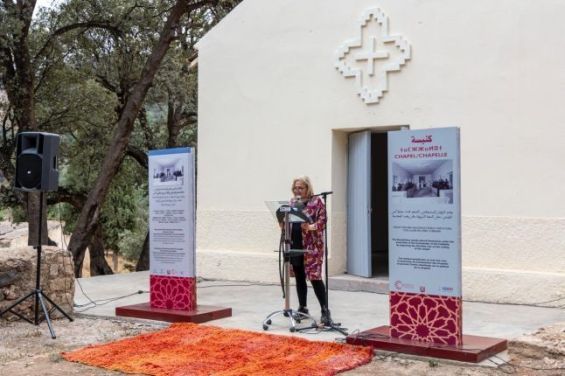A ceremony marking the completion of the first stage of restoration work and improvements to the chapel of the Toumliline monastery, located in the heights of Azrou, was held on Saturday.
This first stage of restoration is the fruit of collaboration between the «Mémoires pour l'Avenir» Foundation, the Ta'aruf Inter-convictional Center of the Rabita Mohammedia des Oulema, with the support of the Belgian Foundation «Future 21» and USAID.
In a statement to MAP, Lamia Radi, President of the Mémoires pour l'Avenir Foundation, underlined the objectives of this first phase of restoration and the importance of the site in Morocco's history.
«Today, we are celebrating together the end of the first phase of restoration work on the former Toumliline monastery, which was the site of unique, exceptional international meetings, the precursors of inter-religious dialogue, from the summer of 1956, three months after Moroccan independence», she explained.
She also highlighted the collaboration with various partners, including the Rabita Mohammedia des Ouléma, the Agence Nationale des Eaux et Forêts, the Meknès Prefectural Council, and the Fès-Meknès region, for the preservation and rehabilitation of the site.
Radi pointed out that this first phase, focused on the emergency restoration of the chapel and securing the site, would pave the way for a second phase aimed at welcoming a wider public and introducing visitors to the history of this emblematic site.
She also highlighted the fruitful collaboration with USAID as part of the Dakira project, which has provided financial support for the restoration of the site and the transmission of its memory to younger generations.
Speaking at the ceremony, Aicha Haddou, President of the Centre Inter-convictionnel Ta'aruf de la Rabita Mohammedia des Ouléma, recalled His Majesty Mohammed VI's speech at the international conference on the rights of religious minorities in Marrakech, in which the Sovereign cited Toumliline as a place of welcome and inter-religious debate.
While highlighting the symbolic dimension of the chapel's restoration, she noted that the main aim was to stabilize and strengthen the foundations, while remaining faithful to the essence of the site. Haddou insisted that the chapel's restoration represents an act of faith in the future and testifies to the desire to ensure that this place will endure for generations to come.
«It's our duty to preserve this heritage, to protect it, but also to pass on this memory to anchor otherness», she added, stressing that this heritage of interreligious dialogue, respect, and mutual recognition belongs to all and must be passed on to future generations.
She stressed that the chapel's preservation nurtures the spirit of demanding fraternity, dialogue, respect, and mutual recognition that has always permeated this Toumliline site.
For her part, Baroness Martine Jonet-de Bassompierre, President of the Future 21 Foundation, emphasized the symbolic importance of restoring the Toumliline monastery chapel, beyond its aesthetic aspect.
She stressed that this place, more relevant than ever in the current context of violence and conflict, should be a center for building a more peaceful future, based on dialogue and mutual respect.
She pointed out that Toumliline, located in a country where inter-religious encounter and dialogue are possible, offers an ideal environment for fostering deeper understanding and mutual respect for different cultures and religions.





 chargement...
chargement...













